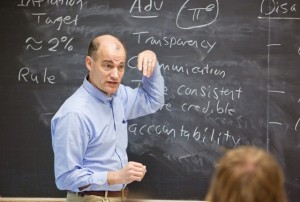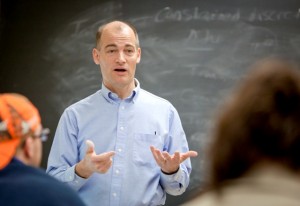
Professor James DeVault
Do we want to preserve the environment or achieve energy independence? Do we want to guarantee healthcare for all or strengthen education? How do we deal with problems like unemployment and poverty?
The answers to some of the most burning questions of our time can be found in the economy, says James DeVault, professor of economics.
“Economics is about how individuals and societies choose to allocate the scarce resources available to them,” he says. “We can’t have everything we want, and how we decide to choose among the different options is what economics is all about. These are all economic questions, and the answers go a long way in determining the quality of life we all will share. Economic forces shape our lives in so many ways that most of us don’t appreciate it, and my job as a teacher is to help students better understand the nature of these forces.”
Sometimes all students need is a great mentor to help them find their passion in life. DeVault had three. Starting with his father, a practicing psychologist and psychology professor, DeVault learned early the value of learning and education.
At University of Rhode Island, where he earned his B.A. in economics and philosophy, DeVault experienced how rewarding it could be to work one-on-one with faculty on research outside the classroom and saw the type of professor he wanted to be. Economics professor Art Mead was the most important factor in his decision to become an academic economist, and philosophy professor Galen Johnson was his honors thesis adviser.
“The honors thesis I conducted with Galen was an incredible experience,” he recalls. “This was pretty unusual at the state school I attended, and it opened my eyes to the benefits of working at colleges and universities where such experiences were more common.”

Professor James DeVault
Influenced by Johnson, DeVault often includes Lafayette students in his own research projects and advises the Fed Challenge team. Fed Challenge is a microcosm of what students encounter in the real world once they leave College Hill. Sponsored by some of the nation’s Federal Reserve banks, it encourages better understanding of the U.S. central bank, the forces influencing economic conditions in this country and abroad, and the ways the economy affects everyone’s lives.
“Through Fed Challenge, students develop their critical thinking, written and oral presentation, and interpersonal skills. As an educator, I have never encountered another course that better develops those skills than the Fed Challenge course,” says DeVault, who shepherded the team to first- and second-place finishes in the national competition the last two years. “It provides students with an educational experience that is rare even at elite liberal arts colleges like Lafayette.”
DeVault, who joined the faculty in 1990 after earning his Ph.D. in economics from University of Wisconsin, is inspired by the fact that he’s giving students new tools to understand what’s happening in the world around them. Hearing from former students who work all over the world for governments, corporations, consulting agencies, and multinational organizations lets him know that he has a hand in shaping tomorrow’s leaders and problem solvers.
“My job as an educator is to provide students with skills and information that will impact their lives positively,” he says. “When I can see that impact, it makes me feel great.”
In addition to working with students through Lafayette’s EXCEL Scholars program and honors theses, two undergraduate research programs at Lafayette, he’s part of a team of professors and students assessing how a $20 million HUD grant received by the city of Easton will impact the redevelopment of public housing on the South Side. DeVault also is conducting his own research on the relationship between trade policy and congressional redistricting.
DeVault is a recipient of the Marquis Distinguished Teaching Award and a two-time recipient of the Omicron Delta Epsilon Teaching Award. He is the author of numerous articles in peer-reviewed journals and has been a presenter at conferences throughout the U.S. and in Canada. He also is a journal referee for Applied Economics, Eastern Economic Journal, Economica, Economics and Politics, Journal of Economic Education, Journal of Economic Integration, Review of International Economics, and Southern Economic Journal.

